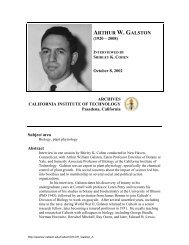Interview with Thomas A. Tombrello - Caltech Oral Histories
Interview with Thomas A. Tombrello - Caltech Oral Histories
Interview with Thomas A. Tombrello - Caltech Oral Histories
Create successful ePaper yourself
Turn your PDF publications into a flip-book with our unique Google optimized e-Paper software.
<strong>Tombrello</strong>–180<br />
it is very interesting to hear words that you wrote, or that you caused to be written, coming out of<br />
the president’s mouth. It’s a good feeling, tempered by the fact that one of the findings of this<br />
report was that a lot of the pieces are good, will work—and the system will fail at nearly every<br />
boundary. Because of the timing, we used the word “Katrina” many, many times. We said that<br />
no matter how good the pieces are, if they don’t work together and the information doesn’t cross<br />
boundaries, the president will have nothing to make a judgment on. Many of the<br />
recommendations are totally classified, but the upshot was, You people have to figure out how to<br />
work together. You’re going to have to do a lot better than Katrina. I know it was a low blow to<br />
keep mentioning Katrina in there, but the director of Homeland Security didn’t have any<br />
objection to it.<br />
John Gordon is a very interesting man. I enjoyed working <strong>with</strong> him. I didn’t expect<br />
much. I’ve known a bunch of four stars in my varied career, and they may be good at military<br />
but they can’t write. They think in PowerPoint and that kind of thing. But not John Gordon. He<br />
wrote at least as well as I did, if not better. He edited extraordinarily well. Livermore got spun<br />
off from UC because of reasons that don’t make a lot of sense, but it’s now run by Bechtel and<br />
the University of California, and so they have a board and John Gordon sits on that. I was lucky<br />
enough to get him on this red team. But that gives you an example of the kind of thing a red<br />
team might do.<br />
Then I got pulled back onto the committee that I had started. I’m not the chair. A friend<br />
of mine is. In some ways this is a lot better. You’re responsible for writing a lot less and you’re<br />
less responsible for pulling the whole report together. I had a philosophy, which they loved. So<br />
many committees will meet, take notes, listen to testimony and presentations, and then the report<br />
takes forever to get out. I demanded, successfully, that a draft of the report be written before the<br />
end of the meeting. So when you have your final debriefing <strong>with</strong> the laboratory management,<br />
you’re going to tell them exactly what you found, and they’re going to hear it in real time.<br />
Because one thing I’ve learned is that a report that comes out more than about a month after the<br />
fact is dead on arrival. This way, they may get their final report a week or two weeks after the<br />
last meeting, but they have heard it all at the last meeting. It’s all been pulled together. It’s all<br />
been integrated to the extent that you can. It’s a snapshot in time. Nobody expects these reports<br />
to be anything more than a very good snapshot by people who are good at getting details right<br />
then, and therefore it has to be immediate. I’m a great believer in this. The lab got terribly<br />
http://resolver.caltech.edu/<strong>Caltech</strong>OH:OH_<strong>Tombrello</strong>_T

















